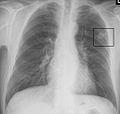Nodule (medicine)
Solid, non-blisterform elevated areas in or under the skin From Wikipedia, the free encyclopedia
In medicine, nodules are small firm lumps, usually greater than 1 cm in diameter.[1][2] If filled with fluid they are referred to as cysts.[2] Smaller (less than 0.5 cm) raised soft tissue bumps may be termed papules.[3]
The evaluation of a skin nodule includes a description of its appearance, its location, how it feels to touch and any associated symptoms which may give clues to an underlying medical condition.[4]
Nodules in skin include dermatofibroma[5] and pyogenic granuloma.[6] Nodules may form on tendons and muscles in response to injury,[7] and are frequently found on vocal cords.[8] They may occur in organs such as the lung,[9] or thyroid,[10] or be a sign in other medical conditions such as rheumatoid arthritis.[11]
Characteristics
Nodules are small firm lumps usually greater than 1 cm in diameter, found in skin and other organs.[1][2] If filled with fluid they are usually softer and referred to as cysts.[2] Smaller (less than 0.5 cm) raised soft tissue bumps may be termed papules.[3]
Evaluation
The evaluation of a skin nodule includes a description of its appearance, its location, how it feels to touch and any associated symptoms which may give clues to an underlying medical condition.[4]
Often discovered unintentionally on a chest x-ray, a single nodule in the lung requires assessment to exclude cancer.[9]
Conditions
Nodules may form on tendons and muscles in response to injury,[7] and are frequently found on vocal cords,[8] They occur in conditions including endometriosis,[12] neurofibromatosis,[6] and in rheumatoid arthritis.[11] They may also feature in Kaposi's sarcoma[13] and gonorrhea.[14]
Other examples
References
External links
Wikiwand - on
Seamless Wikipedia browsing. On steroids.







